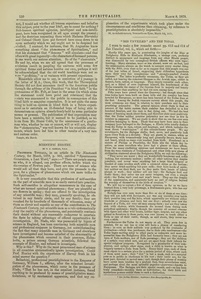< The Causes of the Phenomena of Spiritualism (continued from page 4-241) >
not, I would ask whether all human experience and belief on this subject, prior to the year 1847, are to count for nothing? Sub-human spiritual agencies, intelligent and non-intelligent, have been recognised in all ages except the present; and the doctrines respecting them which Madame Blavatsky and Colonel Olcott have put forward have come down to us upon authority which we say ought not to be despised but studied. I contend, for instance, that St. Augustine knew something about u the phenomena of Spiritualism,” and that his statement that “demons” will simulate—and that often with great ingenuity—the characters of deceased persons, is one worth our serious attention. So of the “elementals.” By and by, when we are all agreed that the processes of evolution result in peopling the universe with some few spiritual forms and natures besides our own, perhaps it will be acknowledged that the old world teachings were not so very “profitless,” or at variance with present experience.
Meanwhile allow me to say, in correction of a passage in the letter of M.A., Oxon, this week, that the Theosophical Society did not first announce itself to the American public through the address of its President “in blind faith” in the pretensions of Mr. Felt, at least in the sense (in which alone the statement could have point and relevance) that the society was announced to the public in consequence of this blind faith or sanguine expectation. It is not quite the same thing to hold an opinion in blind faith in a future experiment as to entertain an ill-founded hope of being able to demonstrate an opinion already firmly held by some particular means or process. The publication of that expectation may have been a mistake, but it seemed to be justified, as we learn from Mr. Storer Cobb, by the assurances of a gentleman who, whether he can or cannot, will or will not, display the “elementaries,” was well known for his scientific attainments, which have led him to other results of a very rare and curious order.
Temple, 4th March.
Scientific Bigotry
Professor Tyndall, in an article in The Nineteenth Century, for March, 1878, p. 501, entitled “Spontaneous Generation, a Last Word,” says:—“There are people among us who, it is alleged, can produce effects, before which the discoveries of Newton pale. There are men of science who would sell all that they have, and, give the proceeds to the poor, for a glimpse of phenomena which are mere trifles to the Spiritualist.”
It is very remarkable that this profession of self-sacrifice on the part of scientific men is so easily carried into practice. Such self-sacrifice is altogether unnecessary in the case of what are termed spiritual phenomena; they are plentiful as are flowers in spring; they are offered to the investigation of any scientific man; they may, generally speaking, be obtained in any family circle, and by any family; they are vouched for by hundreds of thousands of witnesses, many of them as clever and capable as any of the contributors to The Nineteenth Century, yet scientific men as a rule systematically deny the reality of the phenomena, and persistently continue their denial without any reasonable endeavour to ascertain the facts by taking advantage of offered opportunities for investigation. Dr. Slade, who was persecuted by bigots of science in England, has been convincing both scientific men and professional conjurers in Germany, yet notwithstanding the fact that many scientific men in Germany and elsewhere have investigated and become satisfied of the abnormality of the phenomena which occurred in their presence, Helmholtz, a prince among German scientists, followed the example of Huxley, and refused to investigate.
Why is this? Why do the most pronounced men of science in all countries systematically ignore investigation. Could Prof. Huxley with the experience of Harvey fresh in his mind answer the question?
Bellachini, professional prestidigitateur to the Emperor of Germany, William I., affirms, after the minutest investigation of the phenomena, which occur in the presence of Slade, “That he has not, in the smallest instance, found anything to be produced by means of prestidigitative manifestations, or by mechanical apparatus, and that any explanation of the experiments which took place under the circumstances and conditions then obtaining, by reference to prestidigitation is absolutely impossible.”
26, Archibald-terrace, Newcastle-on-Tyne, March 5th, 1878.
"Isis Unveiled" and the Todas
I Wish to make a few remarks anent pp. 613 and 614 of m Isis Unveiled, vol. ii., which set forth:—
Hardly fifty years ago, in penetrating the jungles of the Blue or Neilgherry Hills in Southern Hindustan, a strange race, perfectly distinct in appearance and language from any other Hindu people, was discovered by two courageous British officers who were tiger hunting. Many surmises, more or less absurd, were set on foot, and the missionaries, always on the watch to connect every mortal thing with the Bible, even went so far as to suggest that this people was one of the lost tribes of Israel, supporting their ridiculous hypothesis upon their very fair complexions and “strongly-marked Jewish features.” The latter is perfectly erroneous, the Todas, as they are called, not bearing the remotest likeness to the Jewish type, either in feature, form, action, or language. They closely resemble each other, and, as a friend of ours expresses himself, the handsomest of the Todas resemble the statue of the Grecian Zeus in majesty and beauty of form more than anything he had yet seen among men.
Fifty years have passed since the discovery; but though since that time towns have been built on these hills and the country has been invaded by Europeans, no more has been learned of the Todas than at the first. Among the foolish rumours current about this people, the most erroneous are those in relation to their numbers and to their practising polyandry. The general opinion about them is that on account of the latter custom their number has dwindled to a few hundred families, and the race is fast dying out. We had the best means of learning much about them, and therefore state most positively that the Todas neither practise polyandry nor are they as few in number as supposed. We are ready to show that no one has ever seen children belonging to them. Those that may have been seen in their company have belonged to the Badagas, a Hindu tribe totally distinct from the Todas in race, colour, and language, and which includes the most direct “worshippers” of this extraordinary people. We say worshippers, for the Badagas clothe, feed, serve, and positively look upon every Toda as a divinity. They are giants in stature, white as Europeans, with tremendously long and generally brown wavy hair and beard, which no razor ever touched from birth. Handsome as a statute of Phidias or Praxiteles, the Toda sits the whole day inactive, as some travellers who have had a glance at them affirm. From the many conflicting opinions and statements we have heard from the very residents of Ootakamund and other little new places of civilisation scattered about the Neilgherry Hills, we cull the following:
“They never use water; they are wonderfully handsome and noble looking, but extremely unclean; unlike all other natives they despise jewellery, and never wear anything but a large black drapery or blanket of some woollen stuff, with a coloured stripe at the bottom; they never drink anything but pure milk; they have herds of cattle, but neither eat their flesh, nor do they make their beasts of labour plough or work; they neither sell nor buy; the Badagas feed and clothe them ; they never use nor carry weapons, not even a simple stick; the Todas can’t read and won’t learn. They are the despair of the missionaries, and apparently have no sort of religion beyond the worship of themselves as the lords of creation.”*
We will try to correct a few of these opinions, as far as we have learned from a very holy personage, a Brahmanam-guru, who has our great respect.
Nobody has ever seen more than five or six of them at one time; they will not talk with foreigners, nor was any traveller ever inside their peculiar long and flat huts, which apparently are without either windows or chimney, and have but one door; nobody ever saw the funeral of a Toda, nor very old men among them; nor are they taken sick with cholera, while thousands die around them during such periodical epidemics; finally, though the country all around swarms with tigers and other wild beasts, neither tiger, serpent, nor any other animal so ferocious in those parts, was ever known to touch either a Toda or one of their cattle, though, as said above, they never use even a stick.
Furthermore the Todas do not marry at all. They seem few in number, for no one has or ever will have a chance of numbering them; as soon as their solitude was profaned by the avalanche of civilisation—which was, perchance, due to their own carelessness—the Todas began moving away to other parts as unknown and more inaccessible than the Neilgherry Hills had formerly been; they are not born of Toda mothers, nor of Toda parentage; they are the children of a certain very select sect, and are set apart from their infancy for special religious purposes. Recognised by a peculiarity of their complexion, and certain other signs, such a child is known as what is vulgarly termed a Toda from birth. Every third year, each of them must repair to a certain place for a certain period of time, where each of them must meet; their “dirt” is but a mask, such as a sannyasi puts on in public in obedience to his vow; their cattle are, for the most part, devoted to sacred uses; and, though their places of worship have never been trodden by a profane foot, they nevertheless exist, and perhaps rival the most splendid pagados—goparams—known to Europeans. The Badagas are their special vassals, and—as has been truly remarked—worship them as half-deities; for their birth and mysterious powers entitle them to such a distinction.
<... continues on page 4-243 >
* See Indian Sketches; Appleton’s Hew Encyclopedia, &c.
Editor's notes
Sources
-
London Spiritualist, No. 289, March 8, 1878, p. 110


